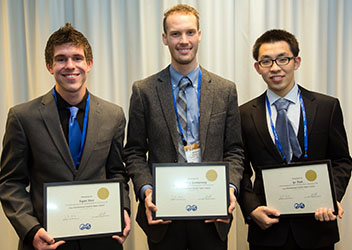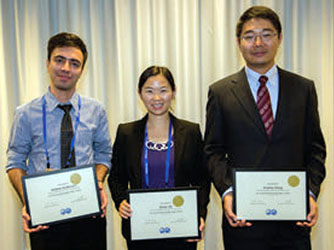Junjing Zhang was awarded first place in the doctoral division and Ryan Rice was awarded third place in the bachelor's division in the Society of Petroleum Engineers (SPE) International Student Paper Contest held during the Annual Technical Conference and Exhibition in the Netherlands in October. These are distinctive achievements that involved many hours of preparation and coaching, and three levels of competition over a 10-month period.
The process began with the Texas A&M University Petroleum Engineering Department's Annual Student Paper Contest (SPC). The objective of the SPC is to develop technical presentation skills in all students. Participation is required by all juniors, seniors and graduate students, who present orally the results of their graduate research or independent study of a petroleum engineering problem to a panel of industry judges. Presentations are 10-15 minutes followed by a five-minute question and answer period with the judges.
“Since the 1970s the Petroleum Engineering Annual Student Paper Contest has been one of the most important professional development opportunities that we provide for our students,” said Duane McVay, SPC director. “The value placed on the paper contest by our former students and industry supporters is evidenced by their substantial participation in and sponsorship of the contest — over 100 industry judges and over $50,000 each year for the last several years.”
In February, after two Saturdays’ worth of competition (479 students for the preliminaries and 51 for the runoffs), division winners were named in the Texas A&M Petroleum Engineering SPC:
- Undergraduate: first place — Ryan Rice; second place — Robert Carruthers; third place — Riyan Ariwibowo
- Masters: first place — Assiya Suleimenova; second place — Kathryn Briggs; third place — Krishna Nunna
- Doctoral: first place — Junjing Zhang; second place — Shusei Tanaka; third place — Ahmed Bader Alkouh
The first and second place undergraduate, masters, and doctoral division winners went on to the SPE Gulf Coast Region SPC, one of the regional contests held by SPE. The regional contests are hosted on a rotating basis by a student chapter within each region. Currently, these regions are Canada, Russia and Caspian, Europe, Gulf Coast North America, Rocky Mountain/Mid-Continent/Eastern North America, Latin America and the Caribbean, Western North America, Africa, Asia Pacific, Middle East and South Asia.
In these regional competitions, the students compete against other students from their region for the opportunity to participate in the International Student Paper Contest.
The Gulf Coast Region SPC was hosted in April at the University of Houston. Texas A&M petroleum engineering students received prizes in each of the three divisions:
- Undergraduate: first place — Ryan Rice
- Masters: third place — Katherine Briggs
- Doctoral: first place — Junjing Zhang
The first-place finishers went on to compete at the SPE International meeting in October. In addition to competing in the International SPC, the participants were also required to submit a written paper on their work to be included in the conference proceedings at the ATCE.

Ryan Rice (above left), who graduated from Texas A&M in May, was awarded third place in the undergraduate division. Rice, who currently works for Rice Energy in Pennsylvania, presented on the topic “Identifying the Ideal Stimulation Design via Multivariate Analysis.”

Junjing Zhang (above right), who graduated in August and now works for ConocoPhillips, presented on the topic “Fracture Conductivity Damage by Water in the Shale Formation.” His paper focused on research he performed for a project sponsored by the Crisman Institute for Petroleum Research at Texas A&M and the RPSEA program of the U.S. Department of Energy. “Dr. (Dan) Hill and Dr. (Ding) Zhu helped me select this interesting subject and guided me to the right research directions,” Zhang said. “Our topic is concerned with the ‘million dollar’ question in shale fracturing. We focused on the problems that the industry as a team are trying to tackle.”